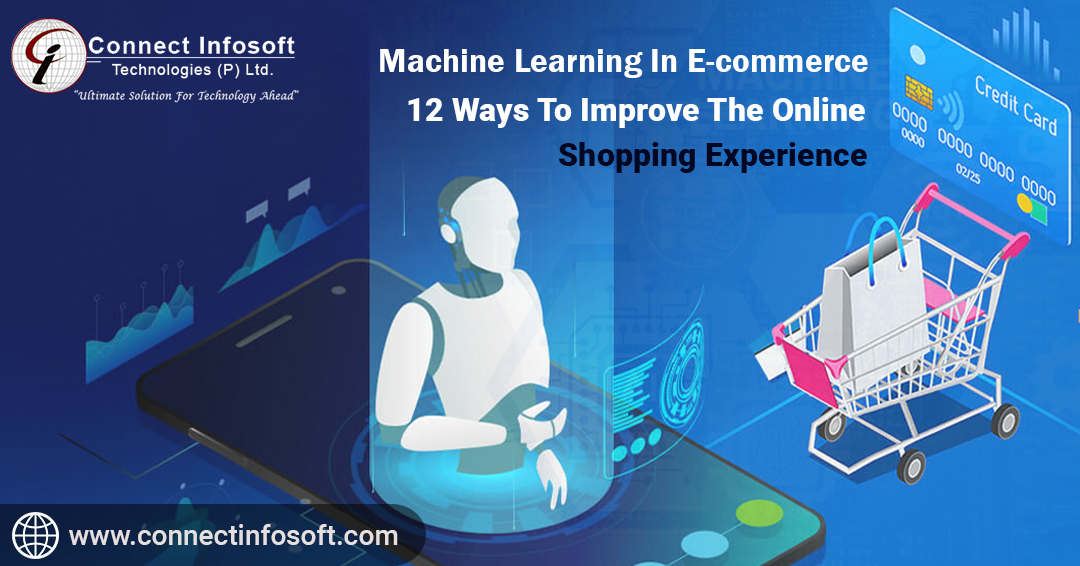Machine Learning in eCommerce 12 Ways to Improve the Online Shopping Experience-Connect Infosoft

E-Commerce is one of the fastest-growing industries. In 2023, the market will earn 5.2 trillion US dollars in sales. E-Commerce machine learning can turn your business upside down (in a good manner, don't panic). Higher revenues, lesser losses, improved customer happiness and lower returns are just a few of the advantages that AI and ML may provide. Machine learning has a significant impact on improving the online shopping experience in the eCommerce industry.
Here are 12 ways machine learning can be used to enhance the online shopping experience:
Personalized Recommendations:
Machine learning algorithms can analyze user behavior, purchase history and preferences to provide personalized product recommendations, increasing the chances of customers finding relevant and appealing products.
Predictive Analytics:
By analyzing historical data, machine learning can predict customer behavior, such as purchase likelihood, customer churn and product demand. This information helps eCommerce businesses make data-driven decisions and optimize their inventory management and marketing strategies.
Dynamic Pricing:
Machine learning algorithms can analyze market conditions, competitor pricing and customer behavior to dynamically adjust prices in real-time. This enables eCommerce platforms to optimize pricing strategies for maximizing sales and profits.
Customer Segmentation:
Machine learning can segment customers based on various attributes and behavior patterns. This allows businesses to tailor marketing campaigns, promotions and product offerings to specific customer segments, improving engagement and conversion rates.
Fraud Detection:
Machine learning algorithms can analyze patterns in transaction data to identify fraudulent activities, such as credit card fraud or account takeovers. This helps eCommerce platforms prevent fraud and protect their customers' financial information.
Chatbots and Virtual Assistants:
Machine learning-powered chatbots and virtual assistants can provide instant customer support, answer product inquiries, assist with order tracking and even provide personalized recommendations, enhancing the overall customer experience.
Search and Product Discovery:
Machine learning algorithms can improve the search functionality of eCommerce platforms, enabling more accurate and relevant search results. Additionally, image recognition algorithms can enhance product discovery by allowing customers to search for products using images.
Inventory Management:
Machine learning can analyze historical sales data, market trends and external factors to predict product demand accurately. This helps eCommerce businesses optimize their inventory levels, reducing stockouts and overstock situations.
Sentiment Analysis:
Machine learning techniques can analyze customer reviews, feedback and social media data to understand customer sentiment and identify areas of improvement. This enables businesses to address customer concerns and enhance product quality and customer satisfaction.
Product Categorization and Tagging:
Machine learning algorithms can automatically categorize and tag products based on their attributes, descriptions, or images. This streamlines the process of organizing and presenting products on eCommerce platforms, improving the browsing experience for customers.
Upselling and Cross-selling:
Machine learning algorithms can analyze customer purchase history and recommend complementary or higher-value products to customers, increasing average order value and revenue.
Customer Lifetime Value Prediction:
By analyzing customer data, machine learning can predict the potential lifetime value of a customer. This helps businesses identify high-value customers and implement targeted retention strategies to foster long-term loyalty.
Future of eCommerce and Machine Learning
The future of eCommerce and machine learning is filled with immense potential, promising to revolutionize the way we shop and engage with online platforms.
Here are some key trends and possibilities that lie ahead:
Personalization Redefined:
Machine learning algorithms will advance, enabling hyper-personalized shopping experiences. eCommerce platforms will utilize sophisticated customer profiling and real-time data to offer tailored product recommendations, pricing and promotions that align precisely with individual preferences and needs.
Voice Commerce:
With the rising popularity of voice assistants like Alexa, Google Assistant and Siri, machine learning will play a vital role in facilitating voice commerce. Improved natural language processing algorithms will empower customers to make purchases and interact with eCommerce platforms effortlessly using voice commands, delivering convenience and accessibility.
Visual Search:
Machine learning-powered visual search technology will gain prominence, enabling users to search for products using images. By analyzing images and matching them to relevant products, eCommerce platforms will elevate product discovery, creating a more intuitive and seamless shopping experience.
Business Benefits of eCommerce Machine Learning
eCommerce machine learning offers several significant benefits for businesses. Here are some key advantages:
Personalized Shopping Experience:
Machine learning algorithms enable businesses to provide personalized recommendations, offers and shopping experiences to individual customers. This personalization enhances customer engagement, satisfaction and loyalty, leading to increased sales and customer lifetime value.
Improved Sales and Conversion Rates:
By leveraging machine learning algorithms for customer segmentation, predictive analytics and pricing optimization, businesses can enhance sales and conversion rates. Targeted marketing campaigns, optimized pricing strategies and personalized promotions contribute to higher customer engagement and increased revenue.
Enhanced Customer Service:
Machine learning-powered chatbots and virtual assistants can provide instant and efficient customer support, handling customer inquiries, order tracking and issue resolution. This improves customer satisfaction, reduces response times and enables 24/7 support, leading to positive customer experiences.
Efficient Inventory Management:
By leveraging machine learning algorithms for demand forecasting, businesses can optimize their inventory levels, minimizing stockouts and overstock situations. This leads to reduced storage costs, improved operational efficiency and enhanced customer satisfaction through better inventory availability.
Conclusion
Implementing these machine learning techniques requires gathering and preprocessing data, training and fine-tuning the models and integrating them into the eCommerce platform. It is essential to regularly monitor and update the models to ensure optimal performance and adapt to changing customer behavior and market dynamics.


